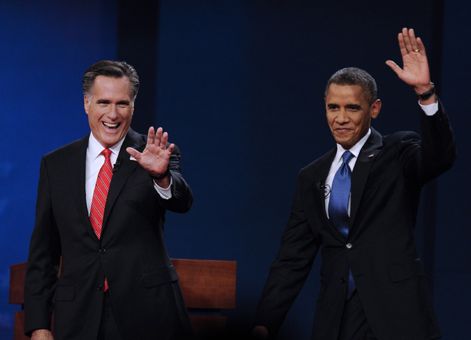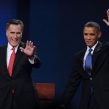
China Evaluates the U.S. Presidential Race
Publication: China Brief Volume: 12 Issue: 21
By:

China watchers in the United States have devoted the better part of this year to understanding the dynamics and vagaries of the once-a-decade power transition that will take place in China later this month. Questions surrounding whether or not the fifth generation leaders will usher in a new era of political and economic reform, which “factions” will gain the upper-hand in the Politburo’s Standing Committee, and what the heir apparent, Xi Jinping’s, views are on the U.S.-China relationship have been fodder for pundits and analysts alike. Yet curiously, the same level of scrutiny about the potential U.S. leadership transition does not appear to be present on the Chinese side. Questions about which candidate might help improve U.S.-China relations, or which candidate might be more amenable to Beijing seem rarely asked. Instead, one is confronted with what could be described as election fatigue with Chinese characteristics. This statement by foreign ministry spokesman, Hong Lei, sums it up well: “We hope the U.S. Republican and Democratic candidates will get rid of the impact of election politics and do more things conducive to China-U.S. mutual trust and cooperation” (Global Times, October 18).
During a recent private conversation with a leading U.S. studies scholar from the China Institutes of Contemporary International Relations (CICIR), he remarked “Its strange that the U.S. presidential election this year is not a very hot topic among pundits in Beijing. Probably there are other hot spots like the South China Sea." It is true that this has been a challenging year for China. There have been several high-profile political scandals and an up-tick in the number of disputes with some of her neighbors in the South and East China Seas. It is not, however, that these other issues have obviated the need for China to report on the U.S. presidential campaign. What is becoming clear is that a two-pronged approach has developed with regard to how China is covering the campaign and the elections this time around. Rather than discuss what could be at stake for China should the United States see a second-term Obama administration or a Mitt Romney-led Republican administration in the White House, the narrative revolves around either the dangers of playing the “China card,” which is considered by many to be “both ridiculous and meaningless” or the fact that there is not a substantial difference between either candidate when it comes to China policy (Xinhua, September 9, 2011).
How Do This Year’s Candidates Play the “China Card?”
Coverage of the U.S. presidential elections in China seem tinged with a sense of resignation that China-bashing has become part of the U.S. political landscape—some go as far as to refer to it as a ritual. Chinese analysts, however, concede that this ritual “negatively impacts China-U.S. relations and leaves Americans with the impression that China is responsible for their country’s decline” (Xinhua, October 18). In fact, playing the “China card,” “China-bashing” or “scapegoating” has become so ubiquitous that it seems simply expected. Though numerous articles opine that China is not the source of U.S. economic woes, they also admit that the politicization (zhengzhihua) of topics such as the economy and unemployment is simply part and parcel of today’s U.S. election campaign (Caixun, July 19; Xinhua, November 14, 2011).
This should not imply, however, that people in China are not paying attention to the claims these two candidates are making. For example, Mitt Romney’s frequent promises to label China as a currency manipulator the first day he is in office has received a lot of coverage. By and large, Mr. Romney has been cited as sounding rather vociferous when it comes to China’s trade and economic practices with some mentioning “Romney’s willful attacks on China…” (Xinhua, October 17). But what is more interesting is that some of the candidate’s double-speak, or change of position, has also been brought to light. For example, Mitt Romney visited China back in 2006 while still governor of Massachusetts and, at that time, made several statements about how the United States should seek cooperation with China based on free trade principles and how he admired the Chinese for their strong work ethic (People’s Daily, November 8, 2011). Certain Chinese feel this is a far cry from the China policy that is outlined on his official campaign website which could be considered “an outdated manifestation of a Cold War mentality” (China Daily, August 27). These changes in tune or “capriciousness” have been “attributed to the deeply rooted bad habits of the U.S. political nature. The United States is a country that needs to find rivals at any time and everywhere” (People’s Daily, November 8, 2011). In other words, the strident language used by presidential candidates is seen more as a manifestation of the flaws in the American political tradition, rather than expressions of a candidate’s actual beliefs.
President Barack Obama is not immune to this sort of criticism either. For example, some have made note of his “strong moves against China, including imposing high tariffs on Chinese products, rejecting Chinese companies’ investment in the United States, and filing trade cases with the World Trade Organization against Chinese companies” (Guangzhou Daily, October 18). In China, there also seems to be an understanding that most incumbent presidents, including Obama, engage in credit-claiming. Several jabs have been made about how President Obama used the debates as a platform to demonstrate his “success" in getting the Chinese yuan to appreciate "because we have pushed them hard…" (Xinhua, October 17).
President Obama and Mitt Romney, thus, are both seen as focusing more on “partisan self-interest” rather than on the potential adverse affects their rhetoric may have on the U.S.-China relationship, writ large (Hexun, July 11).
The Pendulum Always Swings Back to the Middle
The other point that gets emphasized is that no matter which party or president is in power, the U.S.-China relationship has been fairly consistent (with some rough patches now and again) since the two countries ushered in a new era of diplomatic relations forty years ago. As Xie Tao wrote, “…from Richard Nixon to Barack Obama, the dominant trend of U.S. China policy has been one of remarkable continuity. Barring extraordinary circumstances, if there was any noticeable change at all, it was often more of fine-tuning than a bolt of lightning” (China Daily, April 27). Consequently, even though there is a tradition of the opposition candidate campaigning for president by underscoring the incumbent’s so-called “weakness” on China— few seem concerned that this will translate into actual pugnacity once in the Oval Office. For instance, when Clinton was running for office, he attacked George H.W. Bush as being too weak on China; and when George W. Bush was on the campaign trail, he used the same rhetoric to describe the Clinton administration. Obama used the word “coward” when describing some of the latter Bush’s China policies, and today Romney is using the same tactics against Obama (Beijing News, July 31). It should then come as no surprise that China does not dissect each and every utterance made by an U.S. presidential candidate with a fine-toothed comb. After all, “No matter who wins the election, every U.S. president… attaches great importance to the China-U.S. relations. In other words, China-bashing is nothing but a topic which aims to attract the public attention” (Chinamil.com.cn, October 24).
On the other hand, though Chinese observers of U.S. politics might appear analytically complacent when it comes to the presidential elections, this should not imply that they do not closely follow the policies and pronouncements that come out of the White House. One such case in point is the U.S. “pivot” or “re-balance” to Asia. Though some here in the United States might dismiss this strategy as more slogan than substance at this point, Chinese analysts have paid very close attention to nearly every official and semi-official statement on the topic. Some remark that the U.S. strategic rebalancing to Asia has damaged trust and urge the U.S. to “… make its strategic rebalancing less provocative…” and that no matter which candidate wins the election, how they handle relations with China and how they work to build strategic resassurance will be critically important (China Daily, November 1; “Pivot and Parry: China’s Response to America’s New Defense Strategy,” China Brief, March 15). Therefore, though some like Niu Xinchun of CICIR may conclude that during this election season both Obama and Romney are doing little more than attempting “to score political points by attacking China. I don’t think they will really follow through on some of their campaign rhetoric if they are elected,” it seems difficult to square the circle with those analysts who so carefully scrutinize the statements that come from the administration once in office (Global Times, October 18).
The Role of Domestic Politics in Foreign Policy Formulation
Finally, it appears as if the Chinese may be suffering, to a certain extent, from the same disease which they claim plagues many Americans; namely, that they underestimate the role domestic politics plays when it comes to the current election-year rhetoric and “would-be” policies of future U.S. presidents. In the recently released Pew Global Attitudes report on how the U.S. and Chinese publics view each other, “the top concern of Americans—cited by 78 percent—is the large amount of American debt held by China. About seven-in-ten (71 percent) say the loss of U.S. jobs to China is a very serious problem for the [United States] and 61 percent say the same about the trade deficit with China” [1]. Yet when Obama and Romney make statements about debt-rebalancing and fears about job loss to China, most Chinese analysts see this as mere politicking as opposed to a true reflection of the concerns being voiced by the American people. Hence, instead of viewing candidates’ strong statements on China as little more than “a handy tool for U.S. politicians who try to court the votes and support of ill-informed voters by ratcheting up antagonistic sentiment toward China,” perhaps it is important for them to recognize that these statements are sometimes manifestations of domestic sentiment, whether well-informed or not (Xinhua, September 14). Conceivably then, it would be worthwhile for analysts in Beijing to not only pay attention to elite opinions and statements, but also to perform more rigorous analysis of the domestic U.S. political environment since it may prove to be a harbinger for how the U.S.-China relationship evolves in the future.
Notes:
-
Bruce Drake, “American, Chinese Publics Increasingly Wary of the Other,” Pew Research Center, November 1, 2012, available online <https://www.pewglobal.org/2012/11/01/american-chinese-publics-increasingly-wary-of-the-other/>.





